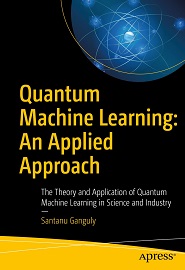
English | 2021 | ISBN: 978-1484270974 | 570 Pages | PDF, EPUB | 48 MB
Know how to adapt quantum computing and machine learning algorithms. This book takes you on a journey into hands-on quantum machine learning (QML) through various options available in industry and research.
The first three chapters offer insights into the combination of the science of quantum mechanics and the techniques of machine learning, where concepts of classical information technology meet the power of physics. Subsequent chapters follow a systematic deep dive into various quantum machine learning algorithms, quantum optimization, applications of advanced QML algorithms (quantum k-means, quantum k-medians, quantum neural networks, etc.), qubit state preparation for specific QML algorithms, inference, polynomial Hamiltonian simulation, and more, finishing with advanced and up-to-date research areas such as quantum walks, QML via Tensor Networks, and QBoost.
Hands-on exercises from open source libraries regularly used today in industry and research are included, such as Qiskit, Rigetti’s Forest, D-Wave’s dOcean, Google’s Cirq and brand new TensorFlow Quantum, and Xanadu’s PennyLane, accompanied by guided implementation instructions. Wherever applicable, the book also shares various options of accessing quantum computing and machine learning ecosystems as may be relevant to specific algorithms.
The book offers a hands-on approach to the field of QML using updated libraries and algorithms in this emerging field. You will benefit from the concrete examples and understanding of tools and concepts for building intelligent systems boosted by the quantum computing ecosystem. This work leverages the author’s active research in the field and is accompanied by a constantly updated website for the book which provides all of the code examples.
What You will Learn
- Understand and explore quantum computing and quantum machine learning, and their application in science and industry
- Explore various data training models utilizing quantum machine learning algorithms and Python libraries
- Get hands-on and familiar with applied quantum computing, including freely available cloud-based access
- Be familiar with techniques for training and scaling quantum neural networks
- Gain insight into the application of practical code examples without needing to acquire excessive machine learning theory or take a quantum mechanics deep dive
Resolve the captcha to access the links!